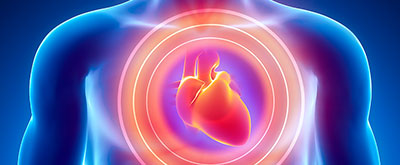A revolutionary discovery in the area of interventional cardiology has been the development and clinical application of Transcatheter Aortic Valve Implantation (TAVI) for the treatment of patients with severe aortic stenosis.
This pioneer technique opens new horizons as an alternative choice to surgical valve repair for high surgical risk patients.
Squeezed inside a catheter, the bioprosthetic valve is guided via the femoral artery, or on the rare occasion via the subclavian artery, and implanted over the existing aortic valve, without the need for extracorporeal circulation.
Our experience from the interventions that are performed at Metropolitan Hospital have shown that this method is safe and particularly effective, and patients are discharged after 3-4 days.

Also performed at Metropolitan Hospital are ablations for the treatment of cardiac arrhythmias with the implementation of advanced technology systems and three-dimensional color mapping of the heart chambers for the precise detection of the arrhythmia, thus achieving successful ablation.
Lastly, heart resynchronization therapy, which is achieved with a pacing of the left ventricle, significantly contributes towards improving the cardiac function in patients with heart failure.
LIFE AFTER A HEART ATTACK
A myocardial infarction (commonly known as heart attack) is a sudden and unexpected event, in which both the patient and their family are called on to recognize and manage both the acute and the long-term phases. To some degree, it is understandable for this unexpected guest to cause patients and their families fear, anxiety and concern. It has been observed that following the initial post heart attack stress comes a sense of security and tranquility during the patient’s hospitalization. This coincides with the gradual acceptance of the new situation, but mainly with the survivor’s improved inpatient course. As the patient prepares for discharge, a new wave of anxiety and insecurity makes its presence, which is mainly related to not knowing how to deal with the survivor on a daily basis at home. Issues like the type of diet, exercise, return to work, sexual activity in the post heart attack period are suddenly converted into intractable problems for which the patient and the family must receive special information.
The aim is for necessary instructions, which are described in this article, to be given in a simple and comprehensible manner for the gradual and effective adaptation to everyday life in the post heart attack period. It is possible that these instructions will enhance the patient’s self-confidence and powers, ultimately contributing to their complete reintegration, but also minimizing the chances of a repeat heart attack.
ISSUE 1 - Rehabilitation of Physical Activity
From the very first days of your inpatient stay, your cardiologist will recommend that you avoid continuous bed rest and will encourage you to sit in a chair, take a few step inside the room and visit the toilet when necessary. Once you return home, and depending on the severity of the heart attack and any complications, you will be recommended to gradually start carrying out moderate activities in the 1st week. These would include climbing and descending 5-10 steps, or taking a short walk of 200-300 meters outside the house, so that at the end of the week you will be able to climb a staircase with 20 steps or walk 800-1000 meters without angina pain, breathlessness or easy fatigue.
In the weeks that follow, you will gradually, but not too quickly, try to increase your physical activity, guided by your physical ability. So, by the end of the 1st month you will have increased your physical activity to your pre heart attack period level, on condition that this activity does not cause you angina pain, breathlessness or severe physical fatigue.
After the 1st month, and provided that your progress has been smooth, you can start aerobic exercise, including light running, bicycle riding, swimming, dancing or running on a treadmill.
Note that prior to commencing aerobic exercise, you will need to be assessed by a cardiologist, who will give you further instructions regarding the level and type of exercise.
After this period, and provided your progress has been smooth and symptom free, you will be able to carry out normal physical activity. A good program would include a moderately intense aerobic workout (e.g. fast-paced walking or cycling) for 30 minutes 5 times a week. Upon completing the intense workout that you will now be carrying out, you may experience mild breathlessness, but under no circumstance angina pain. In the event that it is difficult for you to exercise for 30 minutes, 5 times a week from the onset, try to gradually increase this time (e.g. 10 minutes in the beginning) with a gradual increase to 30 minutes.
ISSUE 2 - Return to Work
It is possible for most patients to return to work following the post heart attack period. This period will be determined by your post heart attack condition and the type of work you do. Patients that make a quick recovery after a minor heart attack are able to return to work in about 2 weeks if their job does not involve heavy manual work. Patients whose job involves heavy manual work will need to return to work later, or on the rare occasion change jobs altogether. In the latter case, the patient’s health plays a decisive role. In any event, your cardiologist will help you to determine the time and the type of work you will be able to carry out after your rehabilitation.
ISSUE 3 - Sexual Activity
Modern scientific data supports that the recommencement of your sexual activity should start a few weeks after you are discharged from hospital. Your condition after the heart attack will play a major role in this sexual activity abstinence period. Therefore, patients with uneventful and uncomplicated post heart attack progress can return to their sexual activity within 2-4 weeks following their discharge from hospital. Adversely, patients with complicated post heart attack progress will return to their sexual life much later. In any event, your cardiologist will ensure that you receive relevant instructions prior to your discharge.
You should be aware that the recommencement of your sexual activity does not increase the risk for a new heart attack, on the contrary it contributes to the gradual rehabilitation of your physical and mental health. After a myocardial infarction, 1 in 3 men may present erectile dysfunction, which may make it difficult to have sex. Although erectile dysfunction is primarily due to psychological reasons, on rare occasions the cause may be due to medication, such as b-inhibitors, that you will be prescribed.
If you experience erectile dysfunction, do not hesitate to mention this to your cardiologist, who will help you in this respect. Your doctor may change the medication you are already taking or prescribe erectile dysfunction medication.
ISSUE 4 - Driving
If you drive a car or motorcycle, you will need to abstain from this for a period of 4 weeks. Following this period, it is normal to get behind the wheel again, provided your health has satisfactorily returned to normal. If you drive a small or large capacity public use vehicle, it is possible that you may undergo special tests before getting behind the wheel of that vehicle.
In any event, you will need to notify your car insurance company, otherwise you may be prosecuted if you are involved in an accident as a result.
ISSUE 5 - Psychological effects
In many cases, a myocardial infarction may be the cause for a great deal of emotion, fear and anxiety, which are usually temporary. In certain cases, however, these emotions may persist for a longer period and on rarer occasions lead to depression. If this depression lasts longer than 3-4 weeks, do not hesitate to discuss this with your cardiologist.
Persistent depressive disorder requires treatment because it degrades the quality of life and severely slows down your normal reintegration and may increase the chances of a new heart attack.
ISSUE 6 - Diet
After a myocardial infarction, the patient is advised to adopt the Mediterranean diet. This means that you can eat more cereals, fruit, vegetables and fish, but you need to eat less meat. It is recommended that you eat white meat (e.g. chicken) once a week and red meat (e.g. beef) once every 2nd week.
Butter and fatty cheeses are not recommended. Food must be cooked with olive oil, but not in excessive quantities. You need to avoid salt and salty foods (e.g. olives, feta, cured meat).
Steamed, casserole and oven-cooked food is acceptable, but fried food must be avoided. Weight loss, to levels that will be determined by your cardiologist, is of great significance in overweight patients. This loss can be achieved with the proper exercise and diet combination.
ISSUE 7 - Smoking
If you smoked before the heart attack, it is imperative that you quit. Smoking doubles the chances of a new heart attack and sudden death, while it cancels many of the beneficial effects of the treatments being applied. In addition, you need to avoid passive smoking because this too increases the risk.
If you find it difficult to quit smoking, your cardiologist can prescribe specific medication that is used to help quitting.
ISSUE 8 - Alcohol
If you consumed alcohol before the heart attack, you can continue drinking small quantities after if you wish. Men cannot exceed the recommended dose of 200 ml wine or 1-2 beers every 24 hours, while these doses are halved for women. It is advisable to discuss this with your cardiologist.
ISSUE 9 - Medications
During your discharge from hospital you will be prescribed medication. The aim of this medication is to relieve any symptoms, but primarily to prevent a new heart attack and in doing so to increase your survival. Some of the medications will be taken for a certain period of time, while others will be taken for life.
If you notice any sign or symptom and believe it is related to the medication, do not hesitate to contact your cardiologist.
Under NO circumstances are you to stop taking medications without previously consulting your cardiologist.
Michael Zairis, MD, PhD
Interventional Cardiologist, Cardiology Clinic Director, Metropolitan Hospital
INTERVENTIONAL CARDIOLOGY UNIT
9 Ethnarchou Makariou & 1 El. Venizelos Streets, 18547 Neo Faliro
+302104809150, +302104809000









































